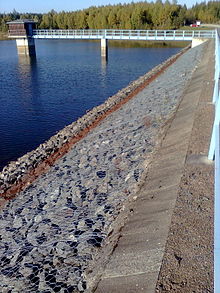Kiliansteich
| Kiliansteich | |
|---|---|
 | |
| Location | Landkreis Harz |
| Coordinates | 51°36′22″N 11°01′15″E / 51.60611°N 11.02083°E |
| Construction began | 1610, rebuilt 1989-1994 |
| Dam and spillways | |
| Impounds | Büschengraben |
| Height (foundation) | 24.6 m (81 ft) |
| Height (thalweg) | 22.9 m (75 ft) |
| Length | 210 m (690 ft) |
| Elevation at crest | 442.23 m (1,450.9 ft) |
| Width (crest) | 4 m (13 ft) |
| Dam volume | 93,000 m3 (3,300,000 cu ft) |
| Reservoir | |
| Total capacity | 1.26×106 m3 (44×106 cu ft) |
| Active capacity | 1.19×106 m3 (42×106 cu ft) |
| Catchment area | 3.9 km2 (1.5 sq mi) |
| Surface area | 17.3 ha (43 acres) |
| Normal elevation | 440.5 m (1,445 ft) |
The Kiliansteich (literally "St. Kilian's Pond") is one of the oldest reservoirs in Germany. The reservoir is located near Straßberg (Harz) in the German state of Saxony-Anhalt and supplies drinking water. It impounds the Büschengraben stream. The lake is part of the heritage area (Flächendenkmal) of the Lower Harz Pond and Ditch System.
The reservoir has a rockfill dam with a watertight clay core that sits on a shale bedrock.
History
[edit]Originally there were four small ponds in a row on the site of the present-day reservoir that had been built for the mining industry. Two of those were broken in 1901 and 1944 and all were in a poor condition. As a result, from 1989-1994 a new, higher dam was built at the site of the lowest dam; the two middle ponds were removed and the upper one, the Upper Kilian Pond (Oberer Kiliansteich), built in 1703, was upgraded into a pre-dam (Vorsperre).
Originally laid as a drinking water reservoir, the lake is used today for flood and drought protection.
The dam on the original "Lower Kilian Pond" (Unterer Kiliansteich) was about 10 m high and had a retaining capacity of 165,000 m³. During the course of renovation the old wooden bottom outlet was salvaged on 25 September 1990 as the result on an initiative by Erika and Siegfried Lorenz. Following long-term conservation work at the Harzwasserwerken in Clausthal-Zellerfeld, who paid for the cost of transports and conservation, it was returned on 19 August 2010 to Straßberg. The wooden raceway is now a museum piece in the Glasebach Pit.
See also
[edit]Sources
[edit]Talsperren in Sachsen-Anhalt, Autorenkollegium, Hrsg. Talsperrenmeisterei des Landes Sachsen-Anhalt 1994


 French
French Deutsch
Deutsch